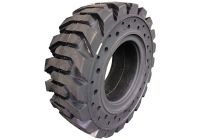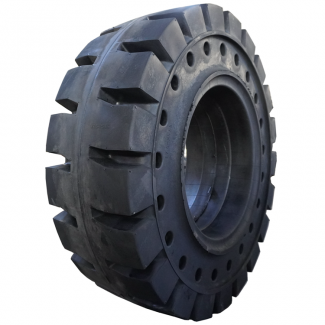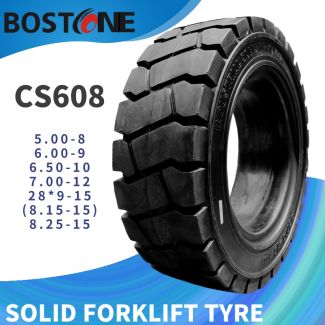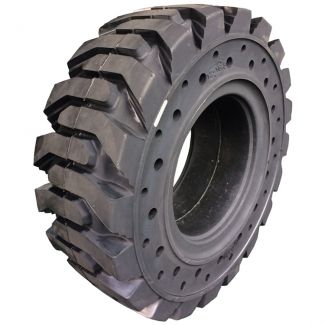Sprayer tyres, Rice transplanter tires and wheels, Agricultural tyres, tractor tires, Industrial Tyres, OTR Tires, skid tires, truck tires

Solid tires, known for their durability, puncture resistance, and low maintenance, have become a valuable choice in industries where equipment reliability and safety are paramount. Bostone, a leader in tire manufacturing, has developed advanced processing technologies to produce high-quality solid tires that meet the specific needs of various applications, including construction, material handling, and industrial equipment. This guide explores the applications, benefits, and processing technology of solid tires, highlighting how Bostone’s innovative solutions cater to industries that require durability and long-lasting performance.
Unlike pneumatic (air-filled) tires, solid tires are composed entirely of rubber or rubber-like materials and contain no air. This design makes them highly resistant to punctures and wear, offering a maintenance-free solution ideal for rugged environments. Solid tires are commonly used on forklifts, industrial machines, and other heavy equipment where reliable performance is essential and where downtime from flat tires is costly.
Solid tires are engineered for strength and resilience. Bostone utilizes advanced materials and precision manufacturing processes to create solid tires that deliver excellent load-bearing capacity, stability, and traction across a range of surfaces.

Solid tires are specifically designed for heavy-duty applications where durability and resistance to harsh conditions are essential. Here are some of the primary uses for solid tires:
Material Handling Equipment
Forklifts, pallet trucks, and other material handling machines often operate in environments where sharp objects and rough surfaces can puncture standard tires. Solid tires provide the resilience needed in warehouses, distribution centers, and manufacturing plants, where equipment must operate continuously without downtime.
Construction Machinery
Equipment like skid steers, loaders, and backhoes benefit from solid tires’ stability and durability. Construction sites are often filled with debris, rocks, and challenging terrain, making solid tires the best choice for safety and performance.
Industrial Vehicles
Solid tires are widely used on industrial tuggers, transporters, and other heavy machinery that navigate factory floors, outdoor storage areas, and loading docks. These tires provide a stable, long-lasting solution that withstands frequent use and heavy loads.
Airport Ground Support Equipment
Ground support vehicles, including baggage carts, container loaders, and pushback tractors, use solid tires to handle heavy loads and continuous operation. Solid tires ensure these machines can reliably operate on various surfaces without risk of blowouts or downtime.
Waste Management Vehicles
Vehicles and equipment used in waste management, such as garbage trucks, loaders, and compactors, benefit from solid tires’ puncture resistance. The constant exposure to sharp objects and rough terrain makes solid tires the best choice for maintaining performance and reducing maintenance in this field.
Solid tires offer several unique benefits over traditional pneumatic tires, making them a preferred choice in demanding applications:
Puncture Resistance
Solid tires are impervious to punctures, eliminating the risk of flats. This feature is particularly valuable in environments where nails, glass, or sharp objects could cause frequent damage to pneumatic tires, such as construction sites and warehouses.
Durability and Long Lifespan
Solid tires have a much longer lifespan than pneumatic tires due to their dense construction and use of high-grade rubber compounds. This longevity translates to fewer replacements, reduced downtime, and lower operational costs.
Heavy Load Capacity
The dense structure of solid tires allows them to support much heavier loads than pneumatic tires. This feature is essential for equipment like forklifts, which carry substantial weight in industrial and material handling applications.
Low Maintenance
Solid tires require virtually no maintenance since there’s no risk of inflation loss, punctures, or blowouts. This reliability allows operators to focus on productivity without concerns about tire maintenance.
Stability
Solid tires provide a firm, stable ride, making them ideal for equipment where stability is critical. This stability improves safety and control, especially in applications involving heavy lifting or maneuvering on uneven ground.

Producing high-quality solid tires involves a sophisticated process to ensure consistency, durability, and performance. Bostone’s solid tires are manufactured using advanced technologies that optimize material properties, structural integrity, and overall quality.
Material Selection and Preparation
The foundation of a durable solid tire lies in the quality of rubber compounds and additives used. Bostone carefully selects high-grade rubber and enhances it with compounds that improve wear resistance, load capacity, and performance. The rubber is then mixed, refined, and prepared for molding.
Compression Molding
Solid tires are typically made through a compression molding process. In this process, the prepared rubber compound is placed in a heated mold where it undergoes high-pressure compression, taking on the desired tire shape and density. This method ensures that the rubber fills every part of the mold, creating a solid, uniform structure without air pockets.
Curing Process
The molded tires are then cured, or vulcanized, in a controlled environment. Vulcanization involves heating the rubber to improve elasticity, toughness, and strength. During this stage, Bostone carefully controls the temperature and timing to ensure the rubber’s optimal performance properties are locked in.
Precision Finishing
Once cured, each tire goes through a precision finishing process where any excess material or mold marks are removed. This step ensures that the tire has a smooth, even surface, enhancing traction and overall appearance.
Rigorous Testing and Quality Control
Every Bostone solid tire undergoes stringent quality control testing to ensure it meets performance standards. Tests include load-bearing assessments, traction tests, and durability evaluations, verifying that each tire can withstand the demands of real-world applications.

Bostone’s dedication to producing high-performance solid tires goes beyond simply meeting industry standards. With advanced facilities, state-of-the-art testing equipment, and a team committed to innovation, Bostone ensures that every solid tire is built to deliver long-term reliability and efficiency.
Key features of Bostone’s solid tire production include:
Solid tires are an invaluable asset in industries where durability, reliability, and low maintenance are essential. Their ability to withstand harsh environments, support heavy loads, and eliminate the risk of punctures makes them an ideal choice for a wide range of applications. Bostone’s solid tires stand out for their superior quality, advanced manufacturing techniques, and commitment to performance.
For businesses that rely on heavy-duty equipment, Bostone provides dependable solid tire solutions designed to keep operations running smoothly. With Bostone’s expertise and innovation, clients gain access to solid tires that not only meet the demands of challenging environments but also enhance safety, reduce downtime, and deliver long-term value.